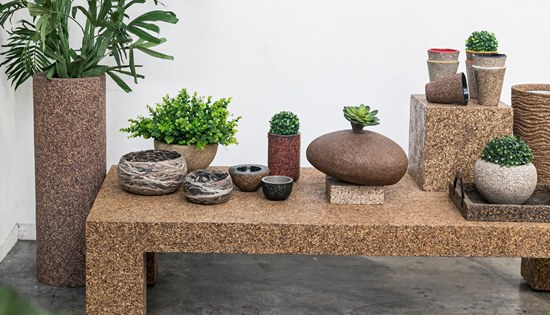Nature’s Legacy home
décor: Dare to innovate

Eco-friendly home décor
makes space in Europe
By
Knowledge Management
and Information Service
August 14, 2023
Respect for nature and humans
The founders of Nature’s
Legacy, husband-wife team Cathy and Pete Delantar, came from humble
beginnings with no plans to start a manufacturing business.
Witnessing the poverty in
their surrounding community, they made a commitment to help by
creating employment opportunities.
“Our Filipino upbringing
instilled in us a thrifty attitude towards the resources we were
given. We would use woven baskets or buyots when going to the public
market,” recalled Pete.
Cathy and Pete transformed
natural resources into patented sustainable materials to create
inspired pieces for the home, for business, and for life.
In turn, the couple
accommodated unskilled craftsmen, taught them the basics of material
application, and turned them into productive individuals.
Ditching dead wood
Nature's Legacy faced a
challenging journey as a sustainable manufacturer.
Its flagship product,
Stonecast – a handmade material that mimics real limestone – was
quickly imitated by other players in the industry.
“Realizing that we could
not compete on price, the company decided to focus on creating
something unique and different,” Pete shared.
During a walk on their
property in Compostela, Cebu, the founders stumbled upon piles of
forest debris that were being used solely as firewood.
With a background in
material application, they soon transformed the readily available
but ignored raw materials into the sustainable invention Naturescast.
Their current range of
products includes Naturescast, Nucast, Marmorcast, and Stonecast.
All four products align with the manufacturing company’s sustainable
product principles: recycled, biodegradable, ethical, and communal.
Destination: export
In 1983, Nature’s Legacy
began exporting to Canada and the United States. At that time, the
company's revenues ranged between P5.0 to P6.0 million per year and
the foreign exchange rate was P18 - P20 to the US dollar.
In 2002, the company made
its first exports to Germany. Today, almost 40% of Nature’s Legacy’s
total exports go to Switzerland and EU member states including the
Netherlands, France, Italy, and Slovenia.
GSP+ does the trick
One of the company’s
objectives is to attract customers who prioritize sustainability,
and who recognize the value and significance of sustainable,
circular, and innovative products and practices. This is the reason
the company has zeroed in on the EU as its niche market.
The EU’s Generalized
System of Preference Plus (GSP+) scheme for Philippine exporters has
created an attractive incentive for firms to do business with EU
member states since 2017, according to Pete, who learned about the
scheme through the Philippine Exporters Confederation, Inc. (PHILEXPORT)
and the Philippine government’s Department of Trade and Industry
(DTI).
“We learned that it
provides advantages not only to our company but also to other
Philippine exporters who sell products to the EU. The elimination of
tariffs on over 1,000 Philippine products under GSP+ can enhance
exports and increase competitiveness.”
Sustainable partnership
with the government
Pete expressed their
appreciation for the continued support from the DTI.
The company received
training, seminars, participation in trade shows, support in product
development, and business matching and networking.
“The agency allowed us to
know customers better – their European culture and design
preferences. By knowing the market, we can tailor-fit our products
and innovation to match their needs,” Pete shared.
DTI’s publications were
instrumental in Nature’s Legacy products getting noticed by the
buying public. Pete and Cathy’s engagement in various missions and
programs added to the buyer’s familiarity with the products.
Walking the talk
Pete and Cathy have not
forgotten their original resolve to support their community through
their business.
Some of the 89 current
employees of the company are second-generation workers who are
equipped with higher education.
“We make sure to take care
of our employees’ basic needs like food, clothing, and shelter. We
also provide them with subsidized housing and quarterly bonuses,”
shared Cathy, who, together with her husband, believes in the
Sustainable Development Goals in uplifting the lives of their
workers.
Their employees live a
mere 15-minute walk from their factory in Cebu and are therefore
contributing to reducing the carbon footprint of their operations.
Looking upwards with ARISE
Plus
Upon the recommendation
from PHILEXPORT, the company was engaged in the ARISE Plus
Philippines project, an endeavor designed to support small- and
medium-sized businesses in the country and open new doors of
opportunity.
“Our aspiration is that,
with the support of ARISE Plus, we can expand our reach to more
buyers and customers who prioritize and share the same values of
Sustainability, Circularity, and Innovation,” said Cathy.
This is also in line with
Pete and Cathy’s future goals for Nature’s Legacy.
Pete and Cathy, tenacious
experts who never give up, plan to introduce into the market a
compact yet revolutionary shelter for people facing disasters or in
need of temporary lodging during a transitional period.
The envisioned shelter is
a breeze to assemble, making it an ideal solution for women and
elderly members of the community looking to contribute to building a
resilient dwelling during trying times.
Nothing is holding back
the couple in daring to undertake innovative solutions, making smart
choices with the use of ingenious materials to produce a
quick-to-install shelter.
The ARISE Plus Philippines
project is enabling Philippine exporters to take advantage of
European Union (EU) market access and the trade privileges granted
under the Generalized System of Preference (GSP+). It supports the
overall EU-Philippines trade relationship and trade-related
policies.
ARISE Plus Philippines is
a project of the Government of the Philippines, with the Department
of Trade and Industry as lead partner together with the Department
of Agriculture, Food and Drug Administration, Bureau of Customs, the
Department of Science and Technology, as well as the private sector.
It is funded by the EU with the International Trade Centre (ITC) as
the technical agency for the project.